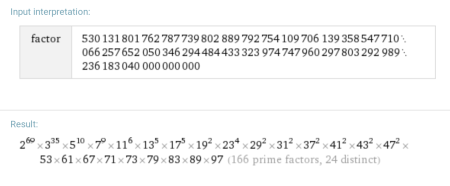 The weekly puzzle from Le Monde is quite similar to older Diophantine episodes (I find myself impossible to point out):
The weekly puzzle from Le Monde is quite similar to older Diophantine episodes (I find myself impossible to point out):
Give the maximum integer that cannot be written as 105x+30y+14z. Same question for 105x+70y+42z+30w.
These are indeed Diophantine equations and the existence of a solution is linked with Bézout’s Lemma. Take the first equation. Since 105 and 30 have a greatest common divisor equal to 3×5=15, there exists a pair (x⁰,y⁰) such that
105 x⁰ + 30 y⁰ = 15
hence a solution to every equation of the form
105 x + 30 y = 15 a
for any relative integer a. Similarly, since 14 and 15 are co-prime,
there exists a pair (a⁰,b⁰) such that
15 a⁰ + 14 b⁰ = 1
hence a solution to every equation of the form
15 a⁰ + 14 b⁰ = c
for every relative integer c. Meaning 105x+30y+14z=c can be solved in all cases. The same result applies to the second equation. Since algorithms for Bézout’s decomposition are readily available, there is little point in writing an R code..! However, the original question must impose the coefficients to be positive, which of course kills the Bézout’s identity argument. Stack Exchange provides the answer as the linear Diophantine problem of Frobenius! While there is no universal solution for three and more base integers, Mathematica enjoys a FrobeniusNumber solver. Producing 271 and 383 as the largest non-representable integers. Also found by my R code
o=function(i,e,x){
if((a<-sum(!!i))==sum(!!e))sol=(sum(i*e)==x) else{sol=0
for(j in 0:(x/e[a+1]))sol=max(sol,o(c(i,j),e,x))}
sol}
a=(min(e)-1)*(max(e)-1)#upper bound
M=b=((l<-length(e)-1)*prod(e))^(1/l)-sum(e)#lower bound
for(x in a:b){sol=0
for(i in 0:(x/e[1]))sol=max(sol,o(i,e,x))
M=max(M,x*!sol)}
(And this led me to recover the earlier ‘Og entry on the coin problem! As of last November.) The published solution does not bring any useful light as to why 383 is the solution, except for demonstrating that 383 is non-representable and any larger integer is representable.


